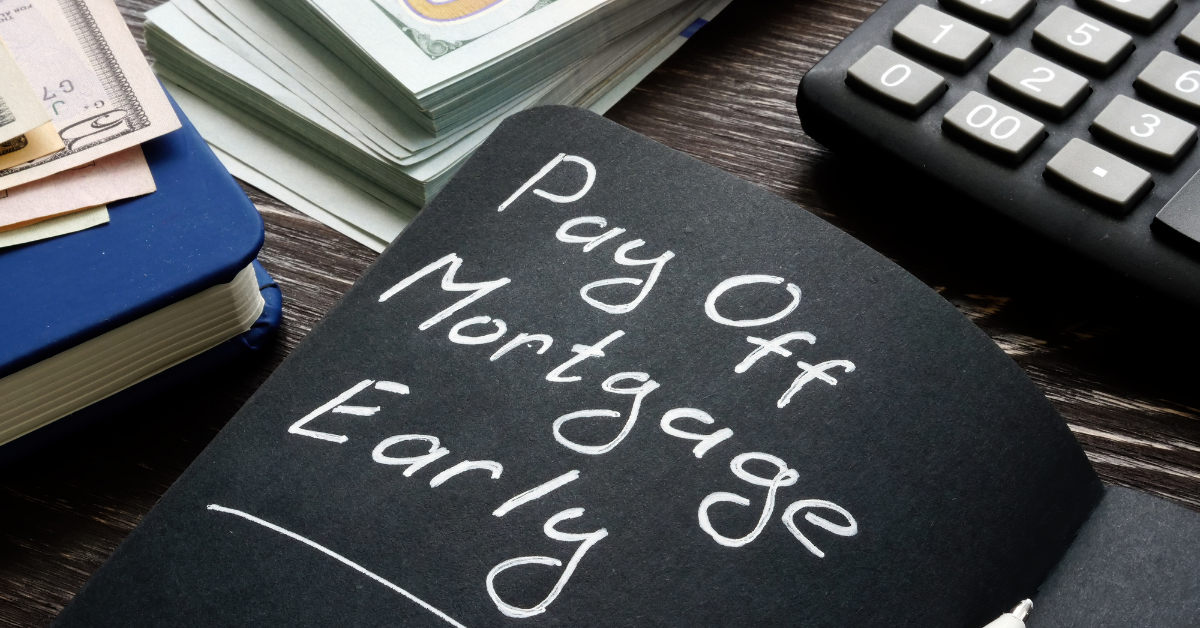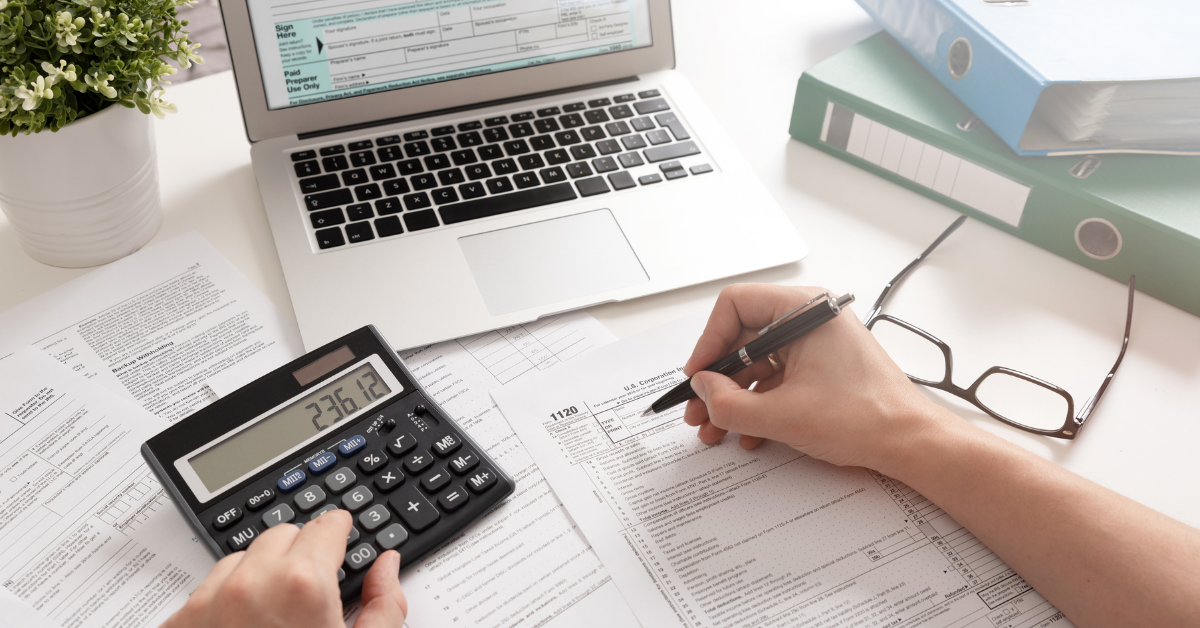Should I Pay Off My Mortgage Before I Retire?
November 5, 2021
Should I Pay Off My Mortgage Before I Retire?
November 5, 2021
Share this post:
Last updated: 02/28/2024

Homeownership generally means having a mortgage looming over you for 15–30 years—an intimidating thought for some. It’s only natural that you want to pay that debt off as quickly as possible, especially if you’re nearing retirement and will no longer be accumulating money with your income. There are arguments for both sides of paying off your mortgage before you retire. On the one hand, eliminating monthly mortgage payments from your budget can offer immediate benefits, like more cash flow, and the long-term benefits of eliminating a major expense in retirement, like having to withdraw less from your retirement accounts for your living expenses; on the other hand, but other factors may make it a poor choice—or even impossible—for some. Of course, paying off your home is like paying yourself, putting more equity into something you own. But before you decide to pay off your mortgage, perhaps with an inheritance, retirement funds, or savings, here’s what you need to consider.
The first step before even considering paying off your mortgage is to find out if you can. Depending on your loan’s terms, you might face a prepayment penalty if you pay off your mortgage before the end of your payment schedule. Contact your mortgage lender to find out if you have any restrictions on paying off your loan.
What to Consider Before Paying Off Your Mortgage Early
Your mortgage interest rate
If your mortgage interest rate is higher than the interest rate you’re receiving on the money you’d use to pay it off, it might make sense to do so—as long as the tax consequences are minimal and also make sense for your situation. If you have excess cash sitting stagnant and earning minimal interest in a checking or savings account, and investing elsewhere is unnecessary or not feasible, it may be an easy decision to pay off your mortgage.
To invest or pay off your mortgage?
If your mortgage interest rate is less than the rate of return you receive on your investments, it might be better to invest that money—or keep that money invested if you were planning to pull from brokerage accounts to pay off your loan. The S&P has had an annualized return of about 9.90% between 1926 through 2023, which means your mortgage interest rate is probably far overshadowed by a nearly tripled possible return. For example, if you’re paying 3% on your mortgage interest but earning a return of 7.5% on your investments, it makes sense to keep your money in your portfolio.
Another potentially good investment might be to purchase real estate that could deliver positive long-term cash flow, like rental and/or commercial properties. Of course, no investment is ever guaranteed, so carefully consider the risks and rewards of where you put your money.
Your savings and cash flow
Will all your available cash be tied up in paying off your mortgage? How long will it take you to rebuild your cash stores? Your home is considered an illiquid investment, as it can’t always be easily or quickly converted into cash if the need arises. Using liquid cash to pay off an illiquid home ties up some (or most) of your liquidity. If you have a substantial amount of money saved in retirement accounts, an emergency fund with enough money to cover at least six months of your expenses, AND excess cash in a checking or savings account, it may be financially prudent to pay off your mortgage early.
It’s generally inadvisable to pay off your mortgage if you have to (or plan to) withdraw money from your retirement accounts to do so. Depending on the account type (tax-deferred vs. tax-advantaged, like Roth IRAs), some withdrawals may incur IRS penalties and are considered distributions, which may push you into a higher tax bracket and increase your tax liabilities on your next tax return. However, if this is the route you choose to pay off your mortgage, spreading distributions over several years may help reduce the tax implications.
As Michelle Singletary put it in The Washington Post, “You shouldn’t empty out your savings to pay off your mortgage. That is not a wise financial move. You don’t want to end up house rich and cash poor, meaning all your money is locked into the equity in your home. Equity, I might add, that you can only tap by borrowing other people’s money or by selling your home.”

Tax implications
The Tax Cuts and Jobs Act from 2018 reduced the deductibility of some mortgages and other home debt. While those who itemize deductions on their tax returns can enjoy the tax break from their mortgage interest, many don’t have enough to do so—and it may not be enough to be worthwhile anyway.
Shifting some of the money you might use to pay off your mortgage into tax-advantaged retirement savings accounts can also help reduce your annual tax liability, again putting more money into your overall net worth.
As discussed above, other tax implications exist if you pull from a tax-deferred retirement account and/or that pushes you into a higher tax bracket. Consult a tax professional for more details and for help evaluating if this may affect you when paying off a mortgage.
Your current debt situation
If you have debt with higher interest rates (like student loans or credit cards), consider paying those off first before you touch your lower-interest mortgage debt.
Are you downsizing in retirement?
If you’re planning to sell your home and downsize in retirement, paying off your current mortgage if you have the cash and sizeable retirement savings may make sense. You can use the proceeds from your home sale to purchase a new, smaller home with little or no mortgage.
What are your goals?
If building your wealth is a top financial priority, paying off your mortgage might set you back if you could otherwise invest that money into vehicles that offer more of a return. If living debt-free and taking that monthly mortgage payment to invest somewhere else is your top goal, paying off your mortgage might be the best decision. Also, if your risk tolerance is very low and you can’t stomach the ups and downs of the stock market, paying off your mortgage might help give you some peace of mind.
Alternatives to paying off your mortgage
If you find yourself with extra cash on hand (perhaps due to a raise, bonus, or inheritance), you could make extra payments each year or pay more than your mortgage payment each month if your mortgage lender allows this. Doing so allows you to keep more of your liquidity and results in paying less interest over the course of your loan; you’ll also pay off your loan faster. You could also consider refinancing before you retire for a lower interest rate and/or shorter-term loan.

So, should you pay off your mortgage before you retire? Well, as you’ve likely figured out (and don’t want to hear), it depends! It’s important to consider your unique financial situation, retirement preparedness, and overall goals when making the decision to pay off your mortgage before you retire. Some may feel stressed at the thought of entering retirement with a home loan; paying it off can help them enjoy their retirement more knowing that they have additional cash by eliminating what’s likely their biggest expense in their retirement budget as they begin living on a fixed income and stop working. A financial professional can help you evaluate your payoff options and the implications and benefits of doing so.
If you want to learn about more personalized and advanced strategies, schedule a 15-minute call with our team.
Schedule Your Complimentary 15-Minute Call
Want expert retirement and investing advice? Subscribe to our YouTube channel and check out our weekly podcast with The Sandman!
Listen to Protect Your Assets anywhere you get your podcasts:
Standard Disclosure
This blog expresses the author’s views as of the date indicated, are subject to change without notice, and may not be updated. The information contained within is believed to be from reliable sources. However, its accurateness, completeness, and the opinions based thereon by the author are not guaranteed – no responsibility is assumed for omissions or errors. This blog aims to expose you to ideas and financial vehicles that may help you work towards your financial goals. No promises or guarantees are made that you will accomplish such goals. Past performance is no guarantee of future results, and any expected returns or hypothetical projections may not reflect actual future performance or outcomes. All investments involve risk and may lose money. Nothing in this document should be construed as investment, tax, financial, accounting, or legal advice. Each prospective investor must evaluate and investigate any investments considered or any investment strategies or recommendations described herein (including the risks and merits thereof), seek professional advice for their particular circumstances, and inform themselves about the tax or other consequences of any investments or services considered. Investment advisory services are offered through Liberty Wealth Management, LLC (“LWM”), DBA Liberty Group, an SEC-registered investment adviser. For additional information on LWM or its investment professionals, please visit www.adviserinfo.sec.gov or contact us directly at 411 30th Street, 2nd Floor, Oakland, CA 94609, T: 510-658-1880, F: 510-658-1886, www.libertygroupllc.com. Registration with the U.S. Securities and Exchange Commission or any state securities authority does not imply a certain level of skill or training.
References
Brooks, Rodney. (2021, January 10). Should You Pay Off Your Mortgage Before You Retire? U.S. News. https://money.usnews.com/money/retirement/articles/should-you-pay-off-your-mortgage-before-you-retire
Marquit, Miranda. (2021, July 26). Should I pay off my mortgage early? Bankrate. https://www.bankrate.com/mortgages/early-payoff/
Maverick, J.B. (2021, May 31). What Is the Average Annual Return for the S&P 500? Investopedia. https://www.investopedia.com/ask/answers/042415/what-average-annual-return-sp-500.asp
O’Brien, Sarah. (2021, May 2). Should you pay off your mortgage in retirement? Experts weigh in on whether to cut that debt. CNBC. https://www.cnbc.com/2021/05/02/-should-you-pay-off-your-mortgage-in-retirement-experts-weigh-in-.html
Singletary, Michelle. (2018, September 30). Yes, you should pay off your mortgage before retiring. The Washington Post. https://www.washingtonpost.com/business/2018/10/01/yes-you-should-pay-off-your-mortgage-before-retiring/
TIAA. (n.d.). Should I pay off my mortgage in retirement? https://www.tiaa.org/public/learn/life-milestones/should-you-pay-off-your-mortgage-in-retirement
Weston, Liz. (2021, March 11). Should You Pay Off Your Mortgage Before You Retire? Nerdwallet. https://www.nerdwallet.com/article/mortgages/should-you-pay-off-your-mortgage-before-you-retire
